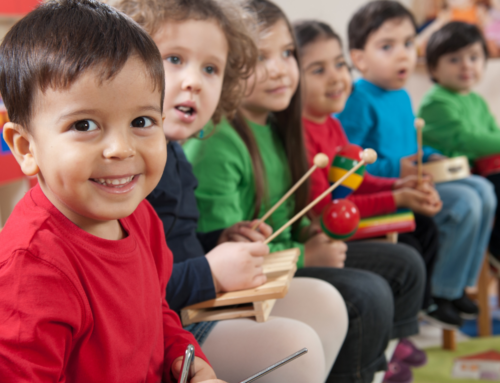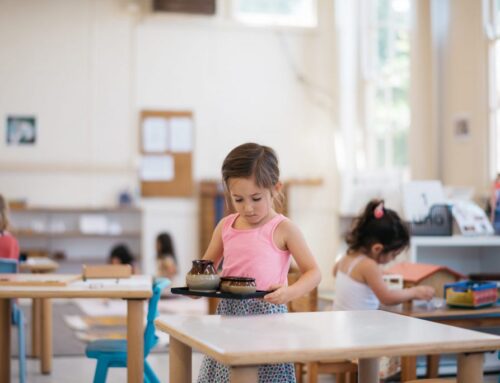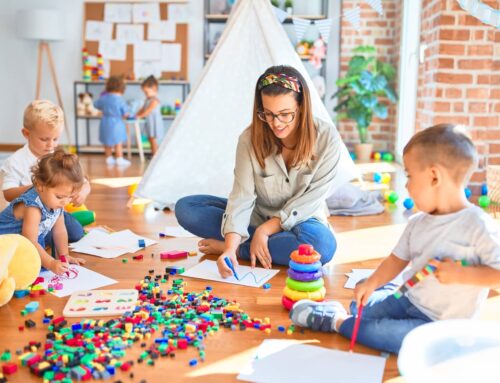The children who are most ready often have parents who do these 5 things:
- Read!Read every day to your child. Have books in every room, in your purse, and in the car. Read favorite books so often that you and your child have them memorized. Visit the library often.
There are many books about going to preschool available from the public library in your area. Choose several to share with your child over the summer before school starts. Talk about the story and how the characters are feeling. Ask how your child is feeling.
- Talk!Developing your child’s oral language skills is a crucial part of preparing her for preschool. Turn off the movie in the car and engage your child in a discussion about the world around her. Ask questions. Talk about nature, and colors, and letters, and feelings. Put down your phone and listen when your child talks to you. Encourage your child to make eye contact and greet others with a “Hello” and a “Good Bye.”
- Play!Spend time every day on the floor playing with your child. Encourage pretend play and role playing. Get messy! Laugh and have fun together. Offer your child time to play by herself, giving her the opportunity to decide what to do.
Take turns being the parent, child, and teacher. Act out common daily routines, such as saying good-bye to mommy and/or daddy, taking off your coat, singing songs, reading stories, having Circle Time, playing outside, and taking naps. Reassure your child that preschool is a good place where she will have fun and learn. Answer her questions patiently. This helps children feel more in control which reduces their anxiety.
- Encourage Independence!Children who are able to take care of some of their personal needs do better at the beginning of preschool than children who rely on adults for everything. Make sure your child has shoes that she can put on herself. Allow extra time before you need to leave the house each day so that your child can put on her own shoes. Support your child in taking care of her own bathroom needs. If she asks help with her pants, or with wiping, try talking her through it rather than doing it all for her. Teach her to wash her own hands and flush the toilet. It’s not glamorous, but these are important skills in preschool!
These skills include unzipping her coat, hanging her coat on a hook, putting on her backpack, fastening her shoes. For example, you might want to have a “race” with your child to see how quickly she can put on her shoes. When you play school together, you can give your child the chance to practice taking off her coat, zipping her backpack closed, and sitting “criss-cross applesauce.” If your child will be bringing lunch, pack it up one day before school starts and have a picnic together. This will give her the chance to practice unzipping her lunch box and unwrapping her sandwich—important skills for the first day!
- Practice!Give your child time away from you. Practice separating and giving your child a little bit of space.
Prepping for Preschool:
The last few weeks before starting preschool seem to fly by! As you begin the countdown to the first day, here are some things to keep in mind:
During the 2 Weeks Before Preschool Starts:
- Purchase a backpack together with your child. If possible, let your child choose it himself. This gives him a sense of control and emphasizes the fact that he is a “big kid” starting preschool.
- Label all items—backpack, jacket, shoes, blanket, teddy bear, etc.—with your child’s name and teacher’s name in permanent ink.
- Contact the preschool’s health professional if your child has medication that he or she takes on a daily basis. There will be special rules and forms to fill out for your child to receive medication at school.
- Figure out how your child will get to school and how she will come home. Talk to your child about the morning and afternoon routine so that she understands that she will be safe, okay, and cared for. Make sure your child meets her before- and/or after-school caregiver, if you are using one.
- Start using your child’s “school bedtime.” Children often go to bed later as the summer months, and longer days, kick in. Help your child get into a preschool schedule by keeping to his school bedtime, beginning about 2 weeks before school starts.
The Night Before Preschool:
- Answer any last-minute questions from your child.
- Let your child choose (weather- and school-appropriate) clothes for her first day.
- Make sure that your child goes to bed on time.
- Pick a bedtime that gives your child a good night’s rest before the first day. Keep the bedtime routine soothing and relaxing. Don’t focus too much (or at all!) on the first day of school unless he wants to.
The First Day:
- Wake up early enough so that you and your child don’t have to rush to get to preschool.
- Make breakfast for your child and, if possible, sit down to eat together—or at least talk with her as she eats and you get ready.
- Review the day’s routine (what preschool will be like, how your child will get to school/come home).
- Pack your child’s backpack together. If your child is bringing lunch, select foods that you know are his favorites. Having some familiarity on his first day is helpful as he adjusts to so many changes.
- Let your child choose a special stuffed animal or blanket to bring to school with her. These “loveys” can help children make the transition from home to school, and can also make naptime easier, too. You may want to send your child with a family photo or favorite book as well. These familiar objects can help if she feels lonely during the day.
At Precious Memories Preschool of Sandy Hollow PreSchool of Sandy Hollow, we offer a special place for children to not only grow and develop along the way, but a place for them to CELEBRATE each and every step. If you are interested in enrolling your child in our program please fill out the form on this page or call us at 860.572.9958







